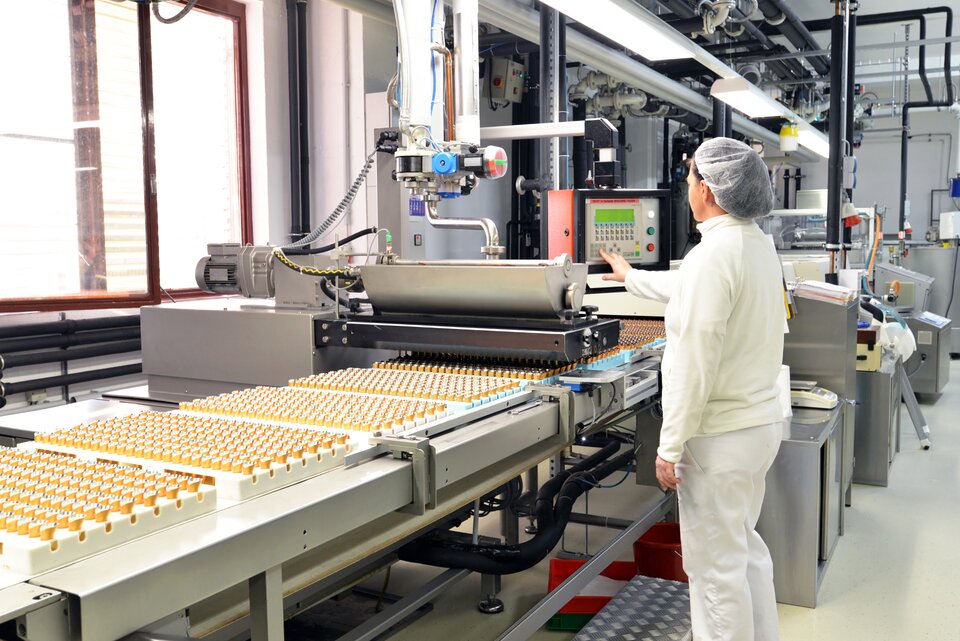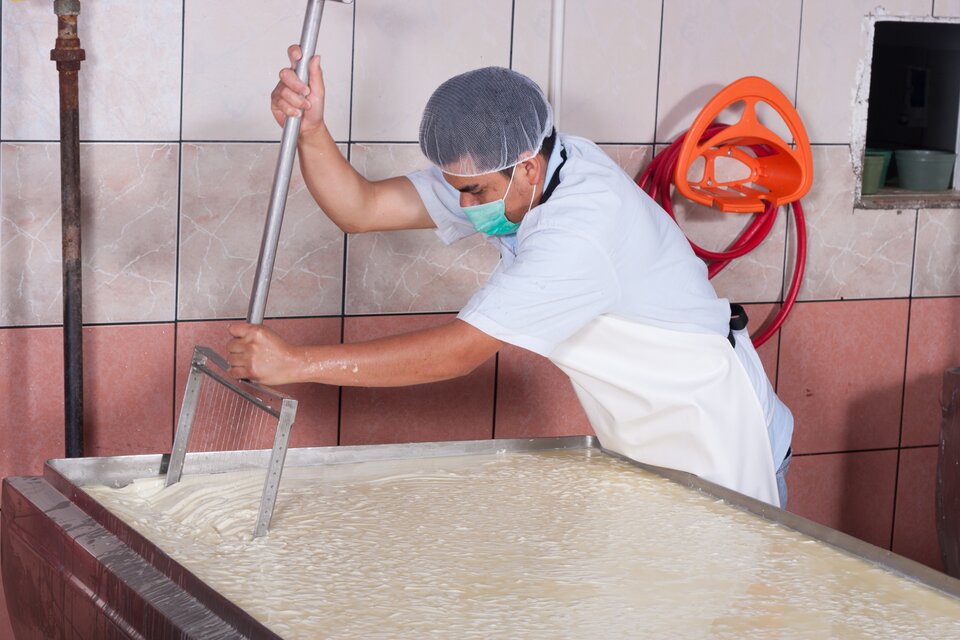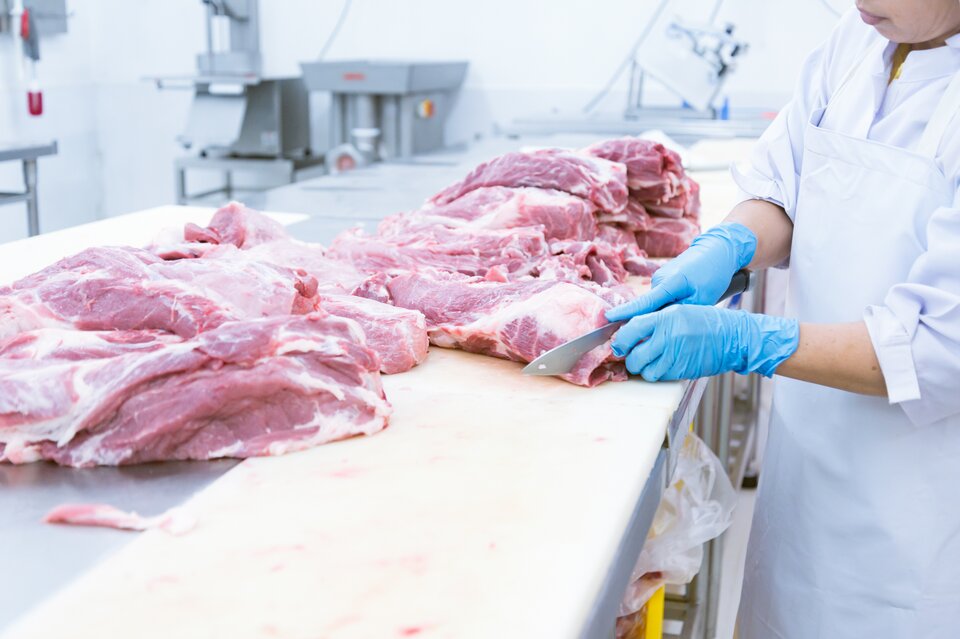Strona 1
Food production equipment operator

Food processing is a branch of economy that becomes more and more mechanised and automated. New techniques and technologies of production are implemented not only in large processing plants but also small craft workshops. Research shows that employers look for people who can operate innovative equipment at all the stages of food production.
A food production equipment operator performs the following tasks:
- preparing raw materials, additives and supplying materials used to produce food,
- making semi‑finished and finished products,
- operating machines and devices used to produce food,
- co‑packaging, packaging and storing food,
- assessing the quality of ingredients, additives, semi‑finished and finished products,
- drawing up technical documentation.
At this point it’s worth emphasizing that the job is a highly demanding one. Food production equipment operators work around hot devices and rotating machine parts and sharp tools. They work in uncomfortable thermal conditions and take shifts.
Naturally, the profession requires physical endurance, attention span, technical skills, a strong sense of responsibility, stress‑immunity and properly developed sense of smell and taste.
A food production equipment operator will find employment in various food processing plants such as confectioneries, dairies, bakeries, fruit, vegetable, and processing plants, food‑selling companies, and at all the stages of the technological process.
It can be said without hesitation that it is a promising profession, one that will still be in high demand in many years to come. New technology keeps arriving on the market which means that qualified and well‑trained specialists are all the more needed.
Food technology specialist

The profession of a food technology specialist is perfect for those who are ambitious, eager to improve their skills and knowledge and interested in such fields of study as chemistry, biology, or technology. Obtaining proper qualifications is no piece of cake, but it’s highly rewarding as future food technology specialists won’t have trouble finding a stimulating and well‑paid job. Food production is a prosperous branch of industry where well‑qualified specialists are always in high demand.
The job includes a number of varied and often complicated activities. One thing is for sure, there’s no humdrum in this profession. The common tasks of a food technology specialist include:
- monitoring the production equipment,
- operating the production equipment,
- planning and managing production process,
- food production.
When it comes to more detailed professional duties, they are practically endless, as they comprise both production- and laboratory‑related tasks.
A person who wishes to become a food technology specialist should be diligent, patient, have good eye‑hand coordination and properly developed sense of smell and taste, the last one being especially important as one of the basic tasks performed by food technology specialists is checking the quality of products with their senses. In other words - they must taste the food themselves. Also, it’s vital for them to be outgoing as the job involves a lot of contact with the coworkers.
A well‑qualified specialist will find employment in:
- institutions that assess and test food,
- internal labs,
- analytic labs,
- food production plants,
- all kinds of enterprises that produce food.
Summing up, once you obtain proper qualifications you’ll easily find employment either in Poland or abroad. The job is undoubtedly a perfect career for anyone who dreams of an exciting and satisfying job.
Milk processing technician

No doubt dairying is one of the most dynamically developing branches of food industry. This is not merely due to the fact that there is a continually rising demand for dairy products, but also due to the technological development which makes it possible to introduce a wide variety of high quality creamery goods into the market. A milk processing technician is a highly desirable profession, not only in Poland, but also abroad. Qualified specialists will easily find a well‑paid job.
Milk processing technicians take care of the following tasks:
- operating milk processing machines and devices,
- planning the technological process,
- assessing the quality of products,
- drawing up technical documentation.
Milk processing technicians work inside, in well ventilated rooms that are protected against contamination. The work is not particularly burdensome, but the fact is that people who are physically fit will manage better.
A person who plans on becoming a milk processing technician should possess the following skills and character traits: diligence, patience, cleanliness, and attention span. Good organisational skills, systematicity, and strong sense of responsibility are no less important. A well‑developed sense of smell and taste and interest in biology and chemistry are helpful in acquiring new skills and as such highly desirable in future milk processing technicians.
Qualified specialists will find employment in all kinds of milk processing plants, so basically anywhere where cheese, yogurts, or semi‑finished products are produced. Dairy farmers are needed at all stages of production and therefore a well‑equipped person who is fully involved in the job can safely look into the future.
The earnings vary based on the position and the type of a particular enterprise, however, it is beyond question, that the job of a milk processing technician is a promising and satisfying career, one that provides huge development opportunities.
Fish processor

Fish processing is one of the most rapidly developing fields of food industry. Thus, the number of job offers in this profession keeps rising. The job might not the be the easiest one, yet it is a perfect fit for those who have good manual skills. Let’s discuss what this job is really about.
The main duties of a fish processor include:
- initial preparation of the raw products that are used to manufacture the final products,
- participation in the technological process of processing fish,
- storage and preservation of fish and semi‑finished products,
- operating the machines and pieces of equipment used in fish processing such as those used to produce fish meal, frozen and canned products, smoking devices, and fish processing devices.
There are several character traits and skills that a fish processor must possess:
- physical durability
- emotional strength,
- self‑control,
- the ability to work in uncomfortable and monotonous environmental conditions,
- good vision,
- the ability to differentiate between colours,
- excellent balance,
- good manual skills,
- good hand‑eye coordination.
A fish processor works under the deck of a fishing trawler or in a land‑based fish factory. In case of the former, they are exposed to vibrations, noise, and have to move over an uneven, slippery floor, where there is a possibility of water entering the underdeck. On the other hand, in the case of the latter, the working conditions depend on the equipment owned by a given facility. The quality of the processing machines and the occupational health and safety standards aren’t without importance as well.
The typical job positions in the profession of a fish processor are: an initial fish processing worker, who is responsible for the preparation of the raw materials to be later transformed into the final products, and an actual fish processing worker, whose job it is to participate in the technological production process. The managerial positions include a shift foreman and a shift manager.
Butcher

If you haven’t decided what profession to choose just yet, and you’re looking for a stable and well‑paid employment, don’t mind monotonous work, you have properly developed sense of taste and smell, and thoroughness and good eye‑hand coordination is your thing, then the job of a butcher is just the career for you. Nowadays there is a considerable demand for qualified specialists both in the country and abroad.
The work is performed in food processing plants, always inside, in sterile rooms that are protected against contamination. It is essential that the butchers follow the OHS regulations for any negligence in that matter can cause a product batch to fail the quality tests. It’s worth knowing that a butcher specialising in cold cuts production does not have to do any killing which makes the job less psychologically exhausting. However, its repetitive nature can be tiresome. When it comes to physical effort, the profession is moderately burdensome. Good physical fitness is naturally desirable, however, it is not an absolute must. Persons with disabilities are hired as butchers as well.
After gaining proper qualifications one can look for a job in semi‑finished products and meat processing plants, butcheries, and large enterprises that do all kind of food production.
It is also possible for a butcher to run their own business. The earnings vary yet they never fall below decent. There’s every reason to assume that the demand for butchers will continue to be high in the years to come. As long as humans eat meat, well‑qualified specialists will have their hands full. High demand for specialists in meat processing, good money, and the satisfying and interesting nature of the job make it a promising career.